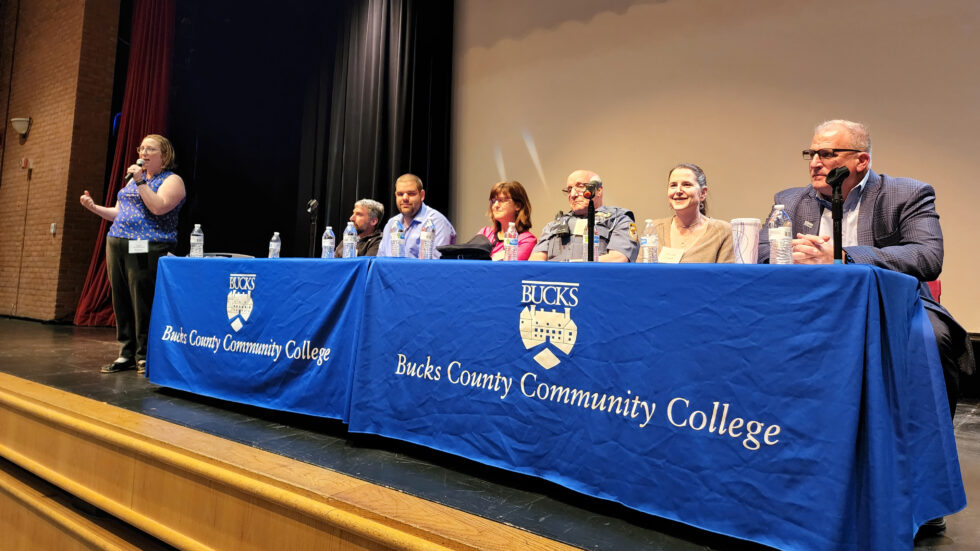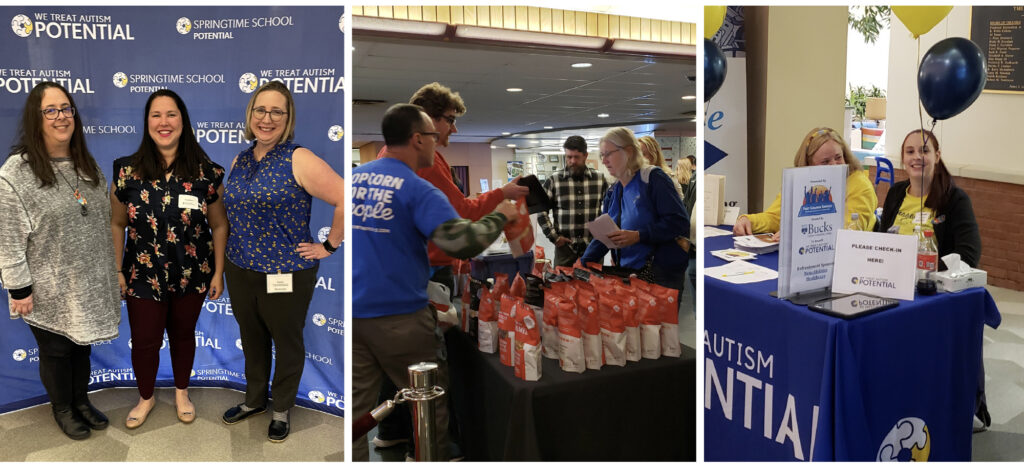Potenial Hosts Exclusive Screening of “In A Different Key: The Story of Autism”

Community at the Heart of Exclusive Screening of “In A Different Key: The Story of Autism”
Community was the theme at an exclusive screening of the documentary film In A Different Key: The Story of Autism, hosted by Potential, Inc., at Bucks County Community College on April 27, 2022. The film will be broadcast nationally later this year.
The program was sponsored by First Children Services, Neurabilities Healthcare and Bucks County Community College.
Ben Hartranft, a national motivational speaker and autism advocate, greeted guests as they entered the Zlock Performing Arts Center, handing out his card, and pitching an invitation to speak at their place of employment. The sense of community was present in the lobby, where guests mingled and made purchases from Bake Ability of Buckingham, who offered treats baked by individuals with different abilities, and Popcorn for the People, a nonprofit that employs individuals with autism.
Once in the intimate setting of the 339-seat theater, the audience settled in to watch In A Different Key, which follows the journey of one mother’s quest to ensure her son’s future happiness and safety in a world that doesn’t always welcome or understand people who are “different.” That journey took her to a small town in rural Mississippi to meet the first person diagnosed with autism, an endearing elderly man living a rich, full life.
This story, which is based on the New York Times bestselling book and Pulitzer Prize Finalist In A Different Key: The Story of Autism, is told through the eyes of journalist Caren Zucker, a Peabody Award-winning 25-year veteran of ABC News and producer and co-writer of the six-part PBS series Autism Now, whose own son has autism. Zucker, along with John Donvan, are the co-directors and co-producers of the film.
An inspiring and informative panel discussion, moderated by Karen Yosmanovich, Clinical Manager at Potential, Inc., followed the screening.
Autism As a “Super Power”
Ben Hartranft kicked off the discussion by stating that sometimes it’s hard to understand what autism is. Hartranft exclaimed, “Autism is a superpower. Having autism isn’t a bad thing; it does not characterize who we are. Everyone is unique and special.”
Amy S.F. Lutz, author and founding board member of the National Council on Severe Autism, is featured in the film, alongside her son Jonah. Lutz spoke about the importance of community and empathy. She referenced a scene in the film where Jonah lies on the cool marble floor at a hair salon and no one seems to mind; they simply walk around him. “I do think people are more accepting of individuals with autism,” she said. “That’s all my family wants is empathy. If you see a family in the grocery store with a kid who is having a meltdown, ask if they need help. If you see a family struggling because they have a family member with autism or a person in distress, please let them cut in front of you. It makes all the difference in that family’s day.”

Ernest Dianastasis is CEO of The Precisionists, Inc., a global administrative services and information technology company dedicated to creating 10,000 jobs for people with disabilities by the year 2025. Dianastasis emphasized the importance of defining people by their ability and strength, not by their disability. “It’s not about figuring out what the challenges are but about focusing on what people can do to excel, and there we find the job that they are most suited for, such as software development and software testing, to scanning documents and data entry. It’s about creating a culture and environment of inclusion and support,” he explained.
How to Keep Your Loved Ones Safe
Keeping ourselves and our loved ones safe was a recurring topic in the film and in the post-screening discussion. Newtown Township Police Officer Jules Ferraro offered important advice on how to have positive interactions with the community and law enforcement.
A question from the audience was in regard to being pulled over by the police. “If you get pulled over, the first thing I’m going to say to you is good afternoon and that I have to advise you that you’re being recorded. As soon as I’m done talking, the first thing you need to tell me is that you have autism because I need to know that — that changes my whole demeanor because if I’m trying to get your attention and you don’t want to look at me, I will have a better understanding. Come right out and tell me.”
Nina Wall, Director, Bureau of Supports for Autism and Special Populations, PA Department of Human Services, added, “Unfortunately, in my work we spend a lot of time hearing about situations where individuals with autism have intersected with the justice system and that the outcomes are not favorable. This propelled us to launch an initiative through our partners that trains the justice and law enforcement community. We have also developed a lot of resources, including paautism.org, which is targeted to different audiences: individuals with autism, parents and caregivers, family members, professionals and community.”
The final question of the evening was from a young man who asked how professionals identify where someone is on the autism spectrum.
Jeff Selman, Chief Operating Officer, First Children Services, explained, “There are three gold standard tools. One is to talk to adults who know the child or the young adult who might be coming in for an assessment, so we do a lot of interviewing and want to know all about the individual. The second is talking to the individual to get a really good understanding, and the third is called the Autism Diagnostic Observation Schedule, which is widely used for diagnosing and assessing autism. We then put it all together and look at all the data and all the things a friend or a spouse or a partner or a teacher might tell us to help us make the diagnosis.” Reflecting on the success of the evening, Kristine Quinby, President and CEO of Potential, Inc., said, “We look forward to hosting more events for the community to gain greater understanding of what autism is and how a community can help support families who have a loved one with autism. Please join us as we come together as a community to support those on the spectrum. We encourage you to be a friend, to share in future events so that we can all embrace the values of acceptance and respect we hold so dear at Potential.”
